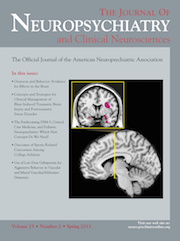Changing Associations Between Cognitive Impairment and Imaging in Multiple Sclerosis as the Disease Progresses
Abstract
The authors explored cross-sectional associations between MRI parameters (lesion metrics, brain volumes, magnetization transfer ratio histograms, and metabolite concentrations) and cognition in 61 patients who experienced clinically-isolated syndromes (CIS) 7 years earlier. IQ decline and poorer overall cognition were associated with T2 white-matter lesions, and slow information-processing with both T2 lesions and gray-matter atrophy. In a previous study of the same cohort, gray-matter atrophy measured shortly after CIS failed to predict development of cognitive impairment years later. Our findings suggest that gray-matter pathology, reflected by atrophy measurements, becomes increasingly important in determining cognition as MS progresses.



